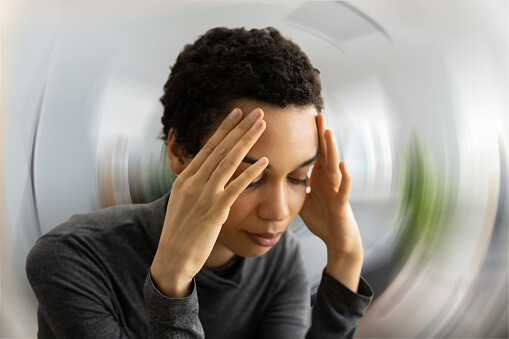
Have you ever woken up feeling off? Before you lift your head off the pillow, do you feel like you are already moving or perhaps like you just got off of a rollercoaster? You think about getting out of bed, but the motion makes you nauseous. You know that you have a long to-do list for the day, but you feel so dizzy it is hard to stand up. The ground below you is solid, but for some reason today it feels rather wobbly. You Google your symptoms and find it could be
related to a bacterial infection, your body getting older, a brain tumor, or worse… In reality however, you may be experiencing vertigo, and our therapists can treat vertigo symptoms sometimes within just a few visits!
Our therapists recently attended a continuing education course on vestibular rehabilitation (VR). In this course, they learned about how to treat vertigo and how to assign at home exercise programs for symptoms of vertigo including dizziness, gaze instability, imbalance, along with
secondary symptoms.
Vertigo symptoms are caused by your inner ear not working properly. Have you ever tried to balance on one foot and been told to pull on your opposite ear to help you balance? That works because your inner ear helps control your balance. There are three main parts to the inner ear that all need to be working together for your body to naturally compensate when you are moving and dancing around. Those three main parts to the inner ear are semicircular canals,
otolith organs, and the cochlea.
A fluid runs through the semicircular canals to make sure that when you are spinning, going from laying down to standing, or twisting side to side your body knows which direction to go. Because it is fluid, it sometimes will continue to move even after you have stopped moving. If you are intentionally spinning and get dizzy, often times spinning in the opposite direction will help the fluid to stop spinning and then you no longer will be dizzy.
The otolith organs work with the crystals in your ear which help you know where gravity is taking you. These crystals naturally work alongside of gravity to pull you down so you know if you are laying down, standing, or hanging out sideways. When these crystals are not in alignment with the otolith organs, it is difficult to keep your balance and can also throw your vision off. The cochlea is what helps us hear the wonderful Christmas music as it plays everywhere this
most wonderful time of the year.
No matter what the reason for your vertigo symptoms, our experienced therapists are trained to know how to treat them and give you tips and tricks to try at home when you experience these symptoms again. Hopefully you never have to deal with vertigo, but when or if you do, call our office or click below to schedule an appointment.
